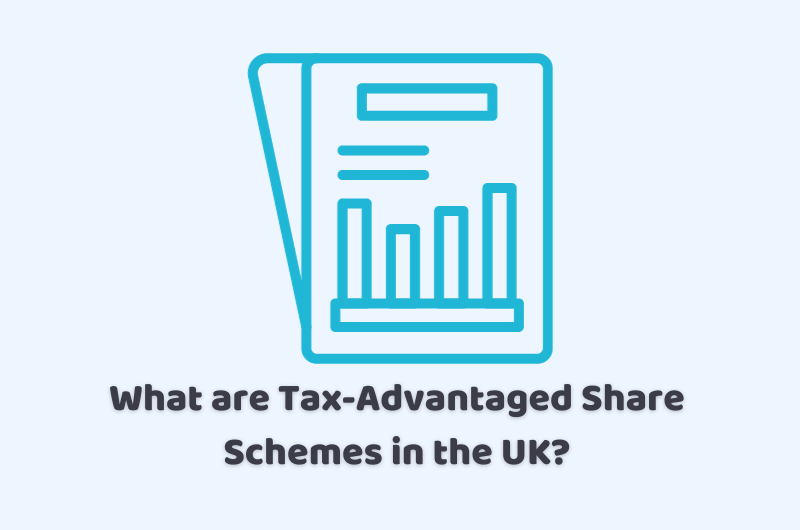
20/10/2023tax , Tax Saving Tips , Taxation
Tax-advantaged share schemes have become popular for businesses in the UK. These schemes incentivize employees with tax benefits to purchase shares in the company. But there are multiple schemes, and if you want to implement one, read till the end.
This blog will provide our readers with essential information on all tax-advantaged share schemes. We will first look at how they work and then give you information about each scheme. In addition, this blog provides all the information you may require for each tax-advantaged share scheme. In the end, you will be provided with the benefits of why you should consider opting for one of these schemes as a business owner.
If you are looking for a private consultation on these schemes, contact us!
How Tax-Advantaged Share Schemes Work?
Generally speaking, these schemes allow the employees of a company to purchase company shares at discounted rates. In addition, they also provide tax incentives to the people who purchase these shares. This can include a lower Capital Gains Tax (CGT) on selling these bonds as well as an exemption from the income tax on dividend earnings. The aim is to have sufficient funding while providing a monetary incentive to the employees to work harder for the company.
4 Tax-Advantaged Share Schemes in the UK
In the UK, there are four major tax-advantaged share schemes. Below, we have mentioned the eligibility criteria for each and what the employees get in compensation.
1. Enterprise Management Incentives (EMI)
If your company is valued at £30 million or less in the UK, you may be eligible for the EMI. A tax-advantaged share scheme allows a company to grant shares up to the value of £250,000 over three years. However, you cannot apply for this if you are working in the banking, farming, property development, legal services, or shipbuilding industries.
The benefits provided to employees who purchase company shares include exemption from Income Tax and National Insurance Contributions (NIC) for the market value at the time of purchase. However, if you are provided with these shares at a discounted rate, you will have to pay both, but only at the discounted rate. In addition, CGT also applies when you sell these shares.
2. Company Share Option Plan (CSOP)
Unlike the first tax-advantaged share scheme, CSOP is provided to all firms, irrespective of how much they are worth. Under this scheme, you can provide shares of value up to £60,000 to your employees in the future at a fixed rate.
For the employees who purchase the shares under this scheme, there are many benefits. This includes exemption from Income Tax or National Insurance Contributions (NIC) on the total difference between the amount paid and their actual worth. Capital Gains Tax will also apply when you sell these shares.
3. Share Incentive Plans (SIPs)
The Share Incentive Plans (SIPs) scheme is more comprehensive and provides benefits for various different types of share options. If you get shares under SIPs and keep them in your plan for 5 years, you will not need to pay Income tax or NIC on their value. In addition, if they remain in your plan until you decide to sell them, you will also be exempted from CGT.
There are four ways to give shares under SIPs. You can provide your employees with free shares worth £3,600 within one year. They can also be provided with partnership shares from their salary before tax deduction for up to £1,800, or 10%. Two matching shares can be given for partnership shares.
4. Save As You Earn (SAYE)
The last tax-advantaged share scheme is Save As You Earn. This scheme is a bit different, as it uses your savings from each month to buy shares at the end of your share contract. You can save up to £500 a month under the scheme.
This scheme provides numerous advantages, such as tax-free interest and a bonus at the end of the scheme. In addition, it exempts the shareholder from Income Tax as well as NIC. You may have to pay CGT to sell these shares. However, if you transfer the shares to an Individual Savings Account (ISA) or to a pension, then CGT is not applied.
Visit CruseBurke to learn more about the schemes and how you can implement them in your corporation.
A Quick Summary
Tax-advantaged share schemes allow employees of a company to purchase shares of that company at discounted rates. In addition, the company shareholders are also given tax exemptions from Income tax, NIC, and CGT.
There are four such schemes. EMI is only for firms valued under £30 million, whereas CSOP is for any firm operating in any industry. In addition, tax-advantaged share schemes include the SIPs and SAYE, which provide more through compensation and are widely preferred by companies in the UK.
If you need assistance with the implementation of these schemes in your firm, click here to get an instant quote.

